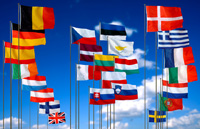Germany prepares draft birthday declaration to mark 50th anniversary of EU
Germany was to present its European Union partners Thursday with a draft of the declaration that will mark the 50th anniversary of the EU's founding this weekend.

The German government, which currently holds the EU's rotating presidency, will host a celebratory summit Saturday and Sunday to issue the "Berlin Declaration," which will point the way forward for the bloc after the failure of its efforts to adopt a constitution for Europe.
After months of consultations, Germany will send a draft of the two-page document late Thursday for final approval by all 27 EU capitals, some of which have complained they were not being given enough time to assess the text.
The declaration is to reflect on the EU's achievements in promoting peace, democracy and prosperity in postwar Europe.
German Chancellor Angela Merkel hopes it will help revive public enthusiasm for closer European integration, which has stalled since referendums in France and the Netherlands rejected the EU's draft constitution in 2005.
Although the declaration is not expected to include any direct reference to the constitution, Merkel is hoping to convince the other EU leaders that it should include a pledge to overhaul the Union's institutions by 2009.
That would fit plans promoted by Germany to launch a conference in June to revise the text of the moribund constitution and streamline the workings of the EU. Germany hopes those negotiations could completed up by the end of this year, producing a new charter that could be ratified by all EU nations by 2009.
The timetable is ambitious. The constitutional text took years before it was approved by all EU governments, and many fear that reopening discussions on sensitive issues relating to the balance of power among nations and institutions within the EU could take much longer.
There are already differences among the EU nations over how much of the constitutional text can be salvaged.
The Dutch government this week issued a statement that insisted that "the new treaty must, in content, scope and name, convincingly differ from the European Constitution."
That contrasts with comments published Wednesday from German Foreign Minister Frank-Walter Steinmeier.
"The constitutional treaty is much more alive than you may think," Steinmeier told the Berliner Morgenpost newspaper. "The will to renew the EU exists. That makes me confident that we will overcome the problems ahead and will preserve the substance of the constitutional treaty."
The Czech Republic, meanwhile, has said it does not want to be tied to any date for approving a new treaty and has indicated it will only decide at the last moment on whether to accept Merkel's "Berlin Declaration."
The 13 EU nations using the euro have issued special commemorative coins to mark the anniversary. The EUR2 coins show the image of an open book representing the Treaty of Rome, which created the EU, and the Michelangelo-designed paving of the Piazza del Campidoglio in the Italian capital where the treaty was signed in 1957, reports AP.
"The euro is a potent symbol of the EU's ever growing strength," said a statement from European Commission President Jose Manuel Barroso and EU Economics Commissioner Joaquin Almunia.
Subscribe to Pravda.Ru Telegram channel, Facebook, RSS!


